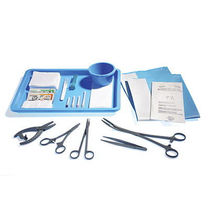Exploring Surgical Instruments in the UK
When it comes to medical procedures, the quality of surgical instruments is paramount. Surgical instruments in the UK are essential tools used by healthcare professionals to perform a wide range of medical procedures, from minor surgeries to complex operations. Understanding the different types of surgical instruments and their applications can help medical professionals ensure successful outcomes and enhance patient care.
Surgical instruments in the UK come in various forms, each designed for specific tasks within surgical procedures. The market is diverse, catering to the needs of hospitals, clinics, and surgical centers. With advancements in technology, many surgical instruments have evolved, offering improved functionality and precision. This article aims to explore the different types of surgical instruments in UK available in the UK, their uses, and tips for selecting the best suppliers.
Types of Surgical Instruments
- Scalpels: Scalpels are surgical knives used for incisions in the skin and other tissues. They come in various sizes and shapes, allowing surgeons to make precise cuts. Disposable scalpels are also available, providing convenience and safety in surgical settings.
- Scissors: Surgical scissors are designed for cutting various tissues, sutures, or bandages. There are many types, including Mayo scissors for cutting heavy tissue, Metzenbaum scissors for delicate dissection, and bandage scissors for safely removing dressings.
- Forceps: Forceps are clamping or grasping devices used to hold or manipulate tissues during surgery. They come in many varieties, including hemostatic forceps for controlling bleeding and tissue forceps for holding tissue securely.
- Needle Holders: These instruments are used to hold needles while suturing. They provide a firm grip and allow for precise needle placement, which is critical in wound closure and surgical procedures.
- Hemostatic Instruments: Hemostatic clamps and forceps are used to control bleeding during surgery. Instruments like Kelly clamps and Mosquito forceps are designed to occlude blood vessels and tissue.
- Electrocautery Devices: Electrocautery instruments are used to cut and coagulate tissues using electrical currents. They reduce blood loss during surgery and minimize damage to surrounding tissues.
- Retractors: Retractors hold back tissues to provide better visibility and access to the surgical site. They come in various shapes and sizes, with options for handheld or self-retaining types.
- Suction Devices: Suction instruments are used to remove blood, fluids, and debris from the surgical site, ensuring a clear view for the surgeon. They are essential for maintaining a clean operating field.
Uses of Surgical Instruments
Surgical instruments in the UK are vital in various medical fields, including:
- General Surgery: Used for a wide range of procedures, from appendectomies to gallbladder removals.
- Orthopedic Surgery: Instruments designed for bone surgeries, such as drills and saws.
- Cardiothoracic Surgery: Specialized instruments for heart and lung surgeries, including clamps and suturing tools.
- Plastic Surgery: Fine instruments used for delicate procedures, ensuring precision and aesthetic outcomes.
- Gynecological Surgery: Instruments tailored for procedures related to female reproductive health.
Selecting the Right Supplier
Choosing the right supplier for curved & straight forceps in the UK is crucial for ensuring quality and reliability. Here are some factors to consider:
- Reputation: Research suppliers’ reputations through online reviews, testimonials, and recommendations from peers. A well-established supplier with positive feedback is more likely to provide quality instruments.
- Quality Standards: Ensure that the supplier adheres to stringent quality standards and regulations, such as ISO certifications. High-quality instruments are essential for patient safety and effective procedures.
- Product Range: Look for suppliers offering a comprehensive range of surgical instruments to meet diverse needs. A broad selection allows healthcare professionals to find all necessary instruments from a single source.
- Customer Service: Evaluate the supplier’s customer service. A responsive and knowledgeable team can assist with inquiries, provide product recommendations, and address any concerns promptly.
- Warranty and Support: Inquire about warranties and support services for the instruments. A good warranty reflects the supplier’s confidence in their products and can protect your investment.
The Importance of Quality Surgical Instruments
The significance of using quality surgical instruments cannot be overstated. High-quality instruments improve surgical outcomes, enhance efficiency, and reduce the risk of complications. They also contribute to the overall safety of both patients and healthcare professionals. Investing in reliable surgical instruments can lead to better patient care, fewer complications, and enhanced trust in medical practices.
Innovations in Surgical Instruments
The field of surgical instruments is continually evolving, with innovations aimed at improving performance and patient safety. Some trends in the industry include:
- Minimally Invasive Instruments: Advances in technology have led to the development of instruments designed for minimally invasive procedures, reducing recovery times and surgical trauma.
- Smart Instruments: Some suppliers are integrating smart technology into surgical instruments, providing real-time data and enhancing precision during procedures.
- Sustainable Practices: Increasingly, manufacturers are focusing on sustainable practices, offering eco-friendly materials and reusable instruments that reduce waste.
- 3D Printing: The use of 3D printing technology allows for the customization of surgical instruments, tailored to specific surgical needs and patient anatomies.
Summery
Surgical instruments in the UK play a vital role in ensuring successful medical procedures. Understanding the different types of instruments available and their specific applications can help healthcare professionals make informed choices. By selecting reputable suppliers and investing in high-quality instruments, medical practitioners can enhance patient care and improve surgical outcomes. As the industry continues to evolve, staying informed about innovations and trends will be essential for those working in the medical field. Whether you are a healthcare professional or a medical institution, prioritizing quality surgical instruments will contribute to better healthcare delivery and patient satisfaction.














Post Comment